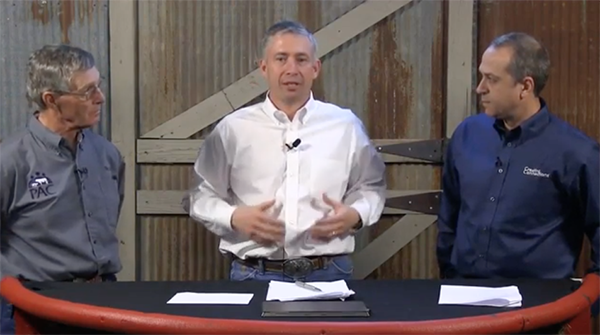Merck Animal Health Releases First CreatingConnections™ Educational Module on Cattle Acclimation
MADISON, N.J., July 21, 2015 – Merck Animal Health today released the first module in the CreatingConnections™ Educational Series that features industry experts who share unique insights and proven techniques to help ensure low-stress cattle handling. This module, now available at www.creatingconnections.info, focuses on acclimation – specifically how to best help cattle adjust and thrive in a new environment, which is critical to the health and well-being of an animal.
“Producers know relocating cattle can cause stress, which can directly impact suppression of the immune system, susceptibility to health challenges and decreased performance. Minimizing that stress is key,” says Paulo Loureiro, D.V.M., Merck Animal Health. “We’ve gathered real-world examples to demonstrate handling techniques that are pivotal to working successfully with cattle and helping them to acclimate more quickly to new surroundings. This video details how to gauge each animal’s individual characteristics, as well as identify the influential animals and work with them to establish trust and confidence throughout the herd.”
In the first module, Dr. Loureiro is joined by Tom Noffsinger, D.V.M., Production Animal Consultation (PAC). The team is rounded out with Dan Thomson, D.V.M., Beef Cattle Institute (BCI), who facilitates a roundtable discussion about acclimation during the video. Both are well known and respected for their expertise in low-stress cattle handling.
“This module really highlights the powerful impact that people can have on animals – without even saying a word,” says Dr. Noffsinger. “Through this video, you learn to use strategic angles and consistent positioning and spacing to convince cattle to volunteer to move calmly. Cattle are intuitive animals and can learn to respond to nonverbal cues from handlers, which helps further create trust between the two.”
The Educational Series is a resource offered to Merck Animal Health customers and is a reflection of the company’s commitment to improving animal well-being and overall herd health through education.
“Doing what’s best for the animal is at the root of every question we ask,” says Rick Sibbel, D.V.M., Merck Animal Health. “How can we reduce the number of trips to the chute? Can we mitigate certain areas of stress for the animals? These are the questions that need to be asked and that we strive to answer when developing new solutions and best practices for the cattle industry. Creating Connections will play an important role in supporting the ongoing evolution of our industry.”
Learn more about the new CreatingConnections Educational Series and other available resource materials at www.creatingconnections.info .
About Merck Animal Health
Today’s Merck is a global healthcare leader working to help the world be well. Merck Animal Health, known as MSD Animal Health outside the United States and Canada, is the global animal health business unit of Merck. Through its commitment to the Science of Healthier Animals™, Merck Animal Health offers veterinarians, farmers, pet owners and governments one of the widest range of veterinary pharmaceuticals, vaccines and health management solutions and services. Merck Animal Health is dedicated to preserving and improving the health, well-being and performance of animals. It invests extensively in dynamic and comprehensive R&D resources and a modern, global supply chain. Merck Animal Health is present in more than 50 countries, while its products are available in some 150 markets. For more information, visit www.merck-animal-health.com or connect with us on LinkedIn and Twitter at @MerckAH.

